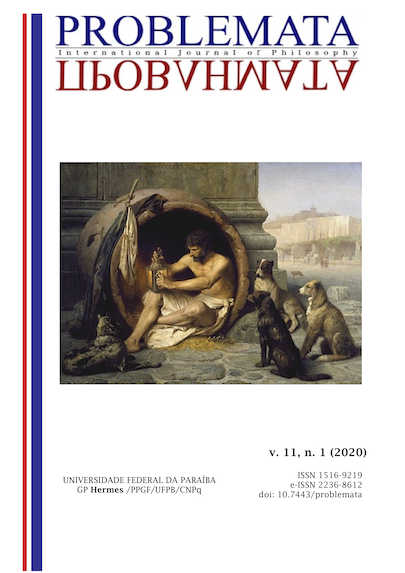HOW TO INTERNALIZE MORAL NORMS?
THE MORAL SENTIMENTALISM OF JOHN STUART MILL IN FOCUS
DOI:
https://doi.org/10.7443/problemata.v11i1.49324Keywords:
Morality, Motivation, Sanction, SentimentAbstract
This paper aims to expose the sentimentalist theory of J. S. Mill as a possible answer to the following question: How do we internalize moral norms? For this purpose, this text will be divided in two parts. First, I expose the role of external sanctions in the formation of the initial motives that shape moral conduct, highlighting its practical inefficiency as sources of obligation. Second, I present the sentimentalist theory of J. S. Mill as internal sanction, highlighting, in contrast, its efficiency as a source of obligation. Finally, I conclude that the sentimentalist theory of J. S. Mill, although limited by the conceptual apparatus of his time, provides a starting point for thinking about the means by which it is possible to put a moral standard into practice.
Downloads
References
Bentham, J. Uma Introdução aos Princípios da Moral e da Legislação. Trad. Luiz João Baraúna. In: Col. Os Pensadores – 3. Ed. – São Paulo: Abril Cultural, 1984.
______. An Introduction to the Principles of Moral and Legislation. Edinburgh: William Tait, 1843.
Crisp, R. Routledge Philosophy Guidebook to Mill on Utilitarianism. London/New York: Routledge Philosophy Guidebooks, 1997.
McCloskey, H. J. John Stuart Mill: A Critical Study. London and Basingstoke: Macmillan and Co Ltd., 1971.
Mill, J.S. Utilitarismo. Trad: Pedro Galvão. Porto, Portugal: Porto Editora, 2005.
______. Collected Works. 33 vols, Ed. J. Robson. Toronto, 1961-91.
Mulgan, T. Utilitarismo. Trad: Fábio Creder. 2. Ed. Petrópolis, RJ: Vozes, 2014.
Miller, D. E. Mill’s Theory of Sanctions. In: The Blackwell guide to Mill’s Utilitarianism. Ed: West, H. London: Blackwell Publishing Lta., 2006.
Rosen, F. Classical Utilitarianism from Hume to Mill. London/New York: Routledge (Taylor and Francis group), 2003.
Ryan, A. The Philosophy of John Stuart Mill. Londres: Routledge, 1974.
Scarre, G. Utilitarianism. London/New York: Routledge (Taylor and Francis group), 1996.
Skorupski, J. (ed.) Cambridge Companion to Mill. Cambridge, 1997
______. John Stuart Mill. London: Routledge, 1991.
______. Why read Mill today? Londres and New York: Routledge, 2006.
Stafford, W. John Stuart Mill. New York: St. Martin’s Press, Inc., 1998.
West, H. A Introduction to Mill’s Utilitarian Ethics. London: Cambridge University Press, 2004.
Downloads
Published
Issue
Section
License
Authors who publish with this journal agree to the following terms:
- Authors retain copyright and grant the journal right of first publication with the work simultaneously licensed under a Creative Commons Attribution License that allows others to share the work with an acknowledgement of the work's authorship and initial publication in this journal.
- Authors are able to enter into separate, additional contractual arrangements for the non-exclusive distribution of the journal's published version of the work (e.g., post it to an institutional repository or publish it in a book), with an acknowledgement of its initial publication in this journal.
-
- Authors are permitted and encouraged to post their work online (e.g., in institutional repositories or on their website) prior to and during the submission process, as it can lead to productive exchanges, as well as earlier and greater citation of published work (See The Effect of Open Access).





